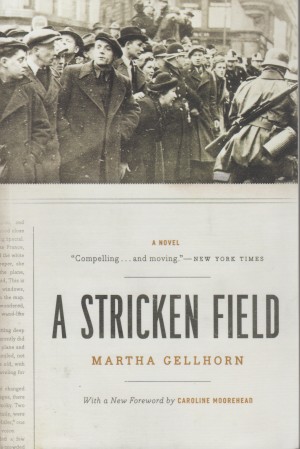
A Stricken Field by Martha Gellhorn (2011. University of Chicago Press. ISBN 9780226286969)
Known as a brilliant war correspondent who covered the Spanish Civil War with her lover and eventual husband, Ernest Hemingway, as well as the Winter War in Finland and many other conflicts up to and including Vietnam, Martha Gellhorn’s fiction reads, in this reviewer’s opinion, much differently than analytical reportage. A Stricken Field is, in many ways, Gellhorn’s apology to the Czech people.
Within the book’s structure, Gellhorn adopts the persona of American reporter Mary Douglas to tell the micro story of Hitler’s usurping of Czechoslovakian independence through Douglas’s eyes and those of Rita, a German communist who has had been expelled from Germany and expatriated to Prague only to await further degradation, torture, and eventually, the horrors of the concentration camps. The author explicitly avoids retelling the macro story of Hitler’s rise to power or the larger tensions between Nazi Germany and Communist Russia that fed Hitler’s paranoia and his need a land buffer between Germany and the U.S.S.R..The author’s choice in this regard is a good one: telling an individual tale of dread and sorrow and fear brings home the era of the slow, agonizing dismantlement of much of free and republican Europe by a madman in ways that, for example, my own novel of the war, Sukulaiaset, cannot. With only a small facet of the messy and complex war to cover, Gellhorn’s choice to narrow her focus is deliberate and smartly crafted.
The juxtaposition of the gaiety and fine dining and good wine enjoyed by Douglas and the other American, English, and French reporters covering the story of appeasement-by which England and France turned their collective backs on their treaties with Czechoslovakia, allowing Germany to gobble up the Sudetenland area of Czech soil, a German-speaking area of the Czech Republic Hitler alleged was being discriminated against by the Czechoslovakian government-and the degradation being experienced by Jewish and communist refugees who had fled Germany and the Sudetenland for Prague is well wrought.
This book should not be confused with a Heminway war novel. It is not, by any stretch of the imagination, Gellhorn’s attempt to place a feminine touch on Farewell to Arms or For Whom the Bell Tolls. While it seems apparent that Papa had an influence on his lover’s style (the curse, short, declarative patterns of Hemingway’s best writing can be detected throughout this novel), this is very much a cerebral story; a dark, foreboding, and somewhat incomplete rendering of what was happening to Rita and the others who had sought refuge from Hitler in a nation that would soon belong to Hitler. The fictional story displays, in the end, despair and resignation-likely emotions that were indeed prevalent and overarching during the slow, deliberate extinguishment of a free society and its people by evil. Gellhorn’s apology, then, is incomplete as she intended it to be. While we all, in reading such historical fiction tinged with memoir, hope and pray for a white knight, a savior such as Oscar Schindler, to stride onto center stage and save at least one of the protagonists populating this tale, that’ s not reality. Gellhorn as Douglas takes no magnificent or deliberate stand against the Gestapo. In the end, Gellhorn as Mary achieves a small victory of sorts-one that I will leave to readers of this fine novel to discover-but as history is clear, she is unable to save those who looked to her with pleading eyes as she flies to safety.
4 and 1/2 stars out of 5. I will read Gellhorn’s other books, including her war reporting and her short stories, based upon the strength of this novel.
Peace.
Mark


